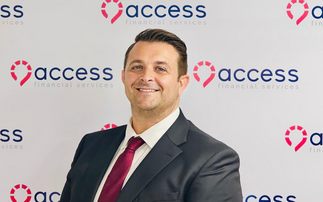Twenty years of the firm, treating customers fairly and satisfying his thirst for adrenaline
It is not just his moustache and need for speed - he rides a motorbike to work every day - that prevents this editor from being able to resist referring to LifeSearch CEO Tom Baigrie as the Tom Selleck of the protection industry.
While his role in starting insurance adviser firm LifeSearch with just two people in 1998 might not make him Magnum, P.I, what you might not know is that - much like Selleck's ex-Navy SEAL character of the ‘80s - Baigrie was in fact an ex-conscript soldier when he arrived to the UK from South Africa in 1981 with no qualifications - the resemblance is almost uncanny.
Rather than living as a private detective in Hawaii, however, Baigrie took a more sensible route (although anyone who has seen his Venom Yellow Triumph Tiger 800 - that's his motorbike by the way - might beg to differ) into selling insurance as a self-employed agent in the days when long-term savings were what everyone sold for their high commissions.
Remembering his first ever customer - who bought a £20 per month pension plan and spent a further £5 a month on tax-deductible life cover - he proudly tells COVER, "His name was Mr Patel, he worked behind the counter in the neighbourhood DIY store in East Sheen. He died not long ago, long after he retired."
Today, LifeSearch employs over 400 people and arranges over 40,000 policies per year through all major insurers which protect families and individuals all over Britain. LifeSearch also recently decided to open a branch in South Africa.
Someone who sees paying claims quickly and efficiently as the beating heart of the protection industry, we checked in with the man behind the moustache for a chat ahead of this year's LifeSearch Protection Awards 2018 on 7 March…
Adam Saville: What's been the biggest change in the protection market over the last 20 years?
Tom Baigrie: "The ending of the insurance-linked savings era with the endowment misselling scandal. A classic example of a useful product made rogue by corporate sales greed and then outlawed by unimaginative regulators. Mind you, when Google arrived in the early ‘00s it rendered all other advertising irrelevant in what seemed like a few weeks. So more relevantly for the future, it's the rapid rise of digital comparison, guidance and trading in protection."
AS: What do you see as the biggest challenge in today's protection market?
TB: "Ensuring we remain relevant as mortality rates decline amongst those of working age. In the very long term, only disability insurance can do that, but income protection is still a long way from being the product it needs to be if it's to sell as much as term life does now, which it needs to one day. We'd love to help build a new version fit for that purpose."
AS: Why is it that only one very large-scale protection advisory business has emerged these last 20 years and do you expect others to do so?
TB: "There are plenty of excellent smaller scale protection specialists and I expect those haven't grown because they are happy as they are. We always wanted to be a large-scale business, we already had a nice IFA business we didn't feel able to grow very much. Of those others who have tried to get very large, I think we are the only one who sought to grow through using an adviser's ‘client-first-profit-second' mentality. That means we use quality of service and advice to generate client loyalty. We've kept to that course through thick and thin. Those whose clients weren't loyal failed in the recession and they would fall again. Growing advisory businesses is hard, so others with grand ambitions turned to non-advised tele-sales, but that's a flawed model in that the sellers are not trained to know what's best for the customer, but they are trained to persuade the customer to do things."
AS: What single thing would most improve our market for consumers? And intermediaries?
TB: "What's best for the former is best for the latter. I'd love to see the end of underwriting at the point of claim. But that's not going to happen any time soon, and the next best thing is happening now: the ability to underwrite and price in real time so that the job can be done there and then for most people."
AS: Where do you see LifeSearch in 10 years' time?
TB: "Our purpose hasn't ever changed and won't. It's to love protecting more people, families and businesses than anyone ever thought possible. So, we'll be doing the same thing, but several times as much as we do now, and most of it digitally and some of it in other markets and maybe even languages."
AS: You've seen competitors come and go, but LifeSearch is still going strong, what's your secret, and why have they come and gone?
TB: "I think we had the right values. Ours start with care, tolerance and honesty. Lots of newer and thus smaller business share those these days, but back when we were growing, so many others seemed to be mainly there to buy the founder a Ferrari lifestyle. That's a hangover from the ‘80s insurers really should have grown out of funding by now."
AS: What are the key differences between the UK and South African life markets?
TB: "Huge, which is why we may not operate there for a few years yet. They have far fewer insurers, a strong broker market serving the wealthy, but with very cosy relationships with the insurers and a big funeral plans market profiting from the tribal poor. Plenty of room for disruption there, and when we've worked out how we'll have a go."
AS: Where do you see LifeSearch's future competition coming from, fintech or the non-advised sector perhaps?
TB: "You can always tell where we think the threats are because we try to become them ourselves. We develop and build fintech as routine now and have long told our teams that as digital solutions become more able to help customers effectively, so the telephone will retreat.
"Of course, if you grow fast enough digitally, there's still plenty of need for phone support. One of my main motivators is to grow fast enough to secure all our jobs. Mind you, I first said that when there were 100 of us and now there are 400, so the future never quite happens as fast as you think, until everything suddenly changes in a way no-one thought of, then it's almost overnight.
"Great online digital customer journeys are the future, so the clear, honest online version of non-advice will keep growing, much of it hopefully powered by LifeSearch, but the phone version is not a threat, except to consumers."
AS: You once said that "The claim is our core product" - what did you mean and why?
TB: "The payment of money when you have suffered a catastrophe is what our market sells. So, it should be done brilliantly. LifeSearch's culture means we help our customers who need to claim. This team doesn't bring in revenue, but they do ensure that all of us remember the good we do each day, and that is priceless. Their experience shows that the process of paying a claim is far too slow and much of that delay is caused by a paper chase and the waiting for medical evidence. Both should be done digitally and be immediate."
AS: You were originally an IFA, why the focus on protection?
"In the ‘90s a friend and his wife had young twins. I persuaded them to arrange proper critical illness and life cover. She got breast cancer a few years later and died two years after that. She, before her death, and he after it, told me just how the money had helped ease her passing and his bereavement because it meant they had the wherewithal to cope without her income and afford care for the kids, so he could keep his job and sanity. I didn't think I'd done better work in my life, so resolved to do much more it. We protect more than 2000 families a week just now. It's a good thing to do."
AS: In 20 years of running LifeSearch, what has been the most important lesson you have learned?
TB: "I met an old flame of my wife's when LifeSearch was young. He was a colonel in the US Marines just back from Iraq. I asked him: What is the single most important job of a leader? I expected something inspirational and motivating, but he said: ‘Inspect what you expect.' He was right. Most endeavours, military, business, you name it… go wrong because people don't do what their leaders meant them to. Spotting that disconnection fast, no matter its cause (and it's often the leaders fault!) and fixing it is easier in small businesses, so few entrepreneurs get very good at it and that's why lots fail to break through to real scale. It's the toughest part of the job, but it's the bit that ensures all the other parts don't just run you faster into the dust."
AS: What are you proudest about in your work and whole life?
TB: "I like to claim I've never left any customer or partner wishing they hadn't done business with me. While being driven by a form of constant constructive dissatisfaction, I've nonetheless had just one business partner and one wife my whole life. The former has just retired but has been replaced by a leadership team that has been with LifeSearch for perhaps a decade on average and are so much better at what they do than ever I was. Loyalty can slow growth, but it makes business, and life, so much more fun!"
You drive a motorbike most every day to work, isn't that foolhardy?
"Cycling would be the alternative and with my motorbike lit up like a Christmas tree it's much the safer. I'm too old for a multi-change commute via ‘the drain' to Bank every day. I gave that up, so I could get home see my kids at bath time in the ‘90s. And I found that gently overtaking 1000 cars on my way into work rather lifted my spirits and set me up for the day. It still does. It's a fair question though, I ask it of myself a lot. But I only commute, and it's the going flat out along winding country roads that does most of the killing. You make your choices and you say your prayers!"
Check out the shortlist for LifeSearch's Protection Awards 2018













